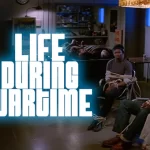*½/**** Image B Sound B
starring Groucho Marx, Carmen Miranda, Steve Cochran, Andy Russell
screenplay by Alan Boretz, Howard Harris, Laslo Vadnay, Sydney R. Zelinka
directed by Alfred E. Green
by Travis Mackenzie Hoover Like many great comedians, Groucho Marx was punished for being too good. One can't actually make movies like Horse Feathers, Animal Crackers and the great Duck Soup and not expect to pay a price, so the studio, in its infinite wisdom, decided to impose normalcy onto The Marx Brothers' films in an attempt to restore public order. This, of course, marked the beginning of his team's decline, so that by 1947 he was reduced to making unsalted soda crackers like Copacabana just to pay the rent. And what a reduction it is: Groucho and hapless co-star Carmen Miranda are the only things worth watching in this limp backstage musical, and while they work all the wonders they can with limited material, it's not enough to keep it from seeming more than a woeful desecration of a great comic's talent.
The first hint of Groucho's lowered station comes from the less-than-inspired plot. He plays Lionel Q. Devereaux, part of an entertainment team including best girl Carmen Navarro (Miranda); when the rent is due, he turns agent in an attempt to defray costs. Hoping to get Carmen some play dates, he approaches the Copacabana club's head Steve Hunt (Steve Cochran), and for reasons too tedious to describe here, he gets her two auditions, as herself and as a veiled French chanteuse named Mademoiselle Fifi. So-called hilarity ensues when both singers are hired; Carmen must go to great pains to conceal her secret identity, resulting in plot machinations both tiresome and silly.
Now, in all fairness, we are talking about a musical–plot considerations are mostly secondary. But while Groucho and Carmen's talents are outsized and libidinal, the production is scaled-down and subdued, giving their unique and restless energies nowhere to go. Alfred E. Green's direction is of the point-and-shoot variety that gets in all of the cheap sets in but fails to elicit any sort of feeling beyond that of watching pictures (barely) move. Thus the musical numbers inexcusably lack any sort of magic or oomph, on the assumption that a bevy of chorines will distract you from the total lack of imagination on hand. As it stands, Green's wet-blanket style manages to not only squander Miranda's unique exuberance–twice–but also humiliate the headliner in a cheap bit called "Go West, Young Man" that resurrects "classic" Groucho to deleterious effect.
Against all odds, Groucho makes some of his lines work, and the film would be considerably less tolerable without his bulletproof insouciance bulldozing the dullards in the cast. But he cries out in vain for a type like Margaret Dumont to play off–someone who is as much a caricature as himself, who fits into the bent logic of his demented little universe. Instead, he has an insurance salesman like Steve Cochran, who does what is asked of him and no more, and his lovesick secretary/aspiring singer Anne (Gloria Jean), who soaks up whole sequences in the kind of wishful thinking that is better served by an hour of "American Idol". There is also a singing creature named Andy Russell, inexplicably playing himself, whose blandness manages the not-inconsiderable feat of making Zeppo Marx look like Ted Nugent; his close proximity to Groucho is surely some kind of karmic punishment for a past-life sin, because he's not fit to touch the hem of the master's moustache. The worst thing about Copacabana is that it tries to fit Groucho into this painfully conventional box instead of allowing him free range on our sensibilities, which is what he–and the audience–so richly deserved.
THE DVDArtisan's full-frame Copacabana disc is not stellar, but it does the job. The b&w print is relatively defect-free considering its age and low priority as a "classic," and the transfer, while not brilliantly detailed, brings out just enough definition to make it a success. The sound, in reprocessed Dolby Surround, is similarly adequate; while the musical numbers don't quite sell themselves (though really, is anybody buying?), they at least sound clear, and you'll get to hear all that great dialogue without hassle.
Lucky you.
91 minutes; NR; 1.33:1; English Dolby Surround; CC; DVD-5; Region One; Republic/Artisan

![Copacabana [DVD]](https://m.media-amazon.com/images/I/513RGQND81L._SL500_.jpg)




